Fallback Session
Your device does not support augmented reality.
We prepared a preview mode, do you want to start it?
Safari on IOS does NOT support augmented reality
1. Click to copy the
ArtificialMuseum link:
2. Download the
WebXR Viewer

3. Copy the link into the url bar of the WebXR Viewer.
Currently, only Blink based browsers support augmented reality. This includes Brave Browser, Google Chrome, Samsung Browser and others.
Your version of chrome is too old and does not support augmented reality.
If you insist on continuing, just press this button:
Please use a different browser for the artificial museum, this browser is missing some critical features and will not provide an optimal experience.
If you insist on continuing, just press this button:
Webgl not supported.
Your device does not support webgl.
Finished loading.
:)
You are too far away.
This means you can not start the augmented reality of this artifact.
We prepared a preview mode, do you want to start it?